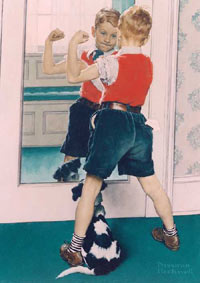Men as protectors

Did you ever see an episode of "Little House on the Prairie"? I did, as well as dozens and dozens more (it was part of my weekly viewing fare as a kid). Now that I think about it, the clearest image of a father in my mind -- as far as the celluloid world is concerned -- has got to be Mr. Ingalls. And I remembered him after reading an interview of educator and author of parenting books, James Stenson, about the role of fathers as family protectors. Here's an excerpt:
Q: Why is it important for fathers to maintain the traditional role as protectors of their families?
Stenson: It's important that we see the role of a father's protection in a broad sense, not just as physical protection from harm.
When we look at the very important ways a man protects his family, we can better understand the dire effects in today's families caused by the man's absence -- either physical or moral -- in family life.
So, what are the different forms of this manly protection?
First of all, a family man devotes his manly powers to protect his wife from anyone who would threaten her. It seems to be a natural instinct among males, to protect the women in their lives -- wife, mother, sisters, daughters -- from outsiders' aggression.
For instance, if a man were standing next to his wife in a crowd and some male stranger turned to speak loudly and angrily toward her, the husband would instantly rise in rage to her defense. Adrenaline would rush through his blood, his muscles would tighten and his first impulse would be to rearrange the aggressor's face.
No self-respecting man would stand by and let anyone treat his wife with disrespect. He would take swift action to defend her.
Related to this physical protection is another aspect of a man's protectiveness, one that fathers today often fail to understand. A man permits no one to threaten or upset his wife -- and this includes their own children.
A hugely important part of a father's job is to defend his wife against their children's rudeness, insolent disobedience and impulsive aggression. This protection counts most to his wife when the children are small -- under 7 years of age -- and later when they enter adolescence. A man will permit no one to disrespect his wife, including -- and even especially -- at home.
A man also defends his family through what he earns in his work. That is, he doesn't just provide for his family; he protects them from poverty. He shelters them, takes care of their needs for a roof, food and clothing. While Dad has a job, the family feels secure. Even in a two-income home, it seems, children sense that Dad is the main provider, and therefore the family's main protector.
Moreover, he protects his children from forces that threaten them here and now: drugs, bullies, criminals, unjust aggressors of all types and potential disasters arising from their inexperience and impulsive mistakes -- such as dashing out into traffic or playing with matches.
Peace, it is said, is the condition we enjoy when other people just leave us alone. Throughout history, the father of a family would protectively stand in the doorway of his home and say, as it were, to the whole world: "Leave us alone. Leave my family alone."
For instance, if a father glanced out his living room window and spotted a male stranger chatting with his small daughter, coyly beckoning to her, he would swiftly lunge into defensive action. He'd race out the door, stride aggressively toward the stranger, then confront the man and demand to know what he wanted. With muscles taut, he would stand between his daughter and this potential aggressor, physically shielding her from harm.
Another example: When his teen-age daughter is being picked up for a date, a father goes out of his way to size up the young man she's going out with. He wants to meet him -- insists on meeting him -- to look him in the eye and intuitively size up his intentions and his worth. A father senses a duty to assess any young male who approaches his daughter. An unspoken message seems to pass between them: "She's my daughter. Treat her nicely, kid, or else ..."
But most of all -- and this is crucially important -- a father protects his children by strengthening their judgment and will so they can later protect themselves. In the lives of his children, he asserts loving leadership toward responsible, competent adulthood.
It is a father's mission -- the challenge that brings out the best in him -- to form in his children the powers and attitudes they will need to succeed in life, to strengthen them so they in turn can later protect themselves and their own loved ones.
So, in his children's eyes a great father is a lifelong leader and teacher. His protective, empowering lessons about right and wrong live on in the inner lives of his children, long after they've left home for good, and indeed long after he has passed to his eternal reward. A great father never stops being a father, for he lives on as a great man in the hearts of his children.
More at Zenit News Agency
** Illustration: The Muscleman (1939), by Norman Rockwell
posted by sunnyday at 4:40 PM
0 Comments:
Post a Comment
< < Home




